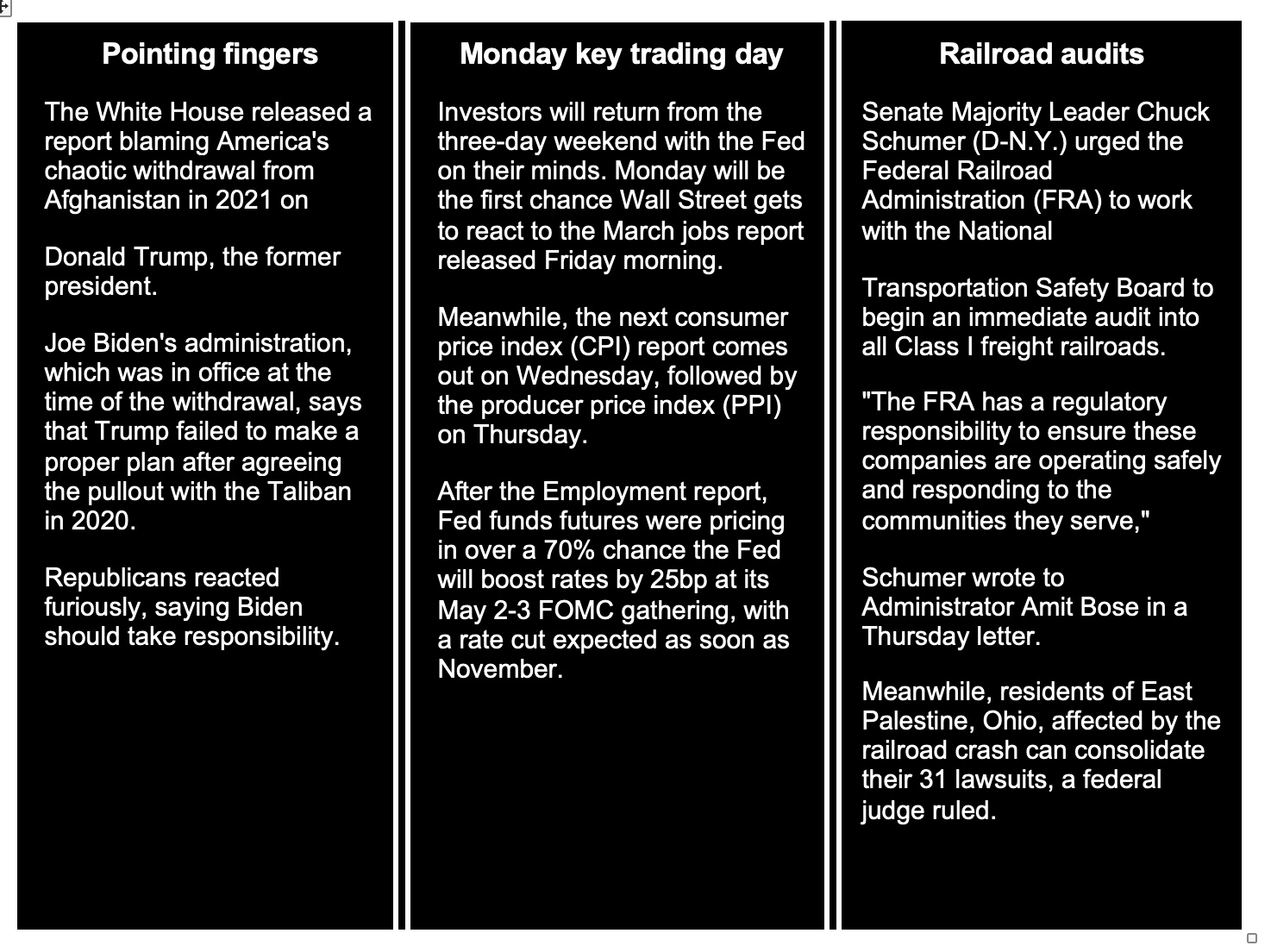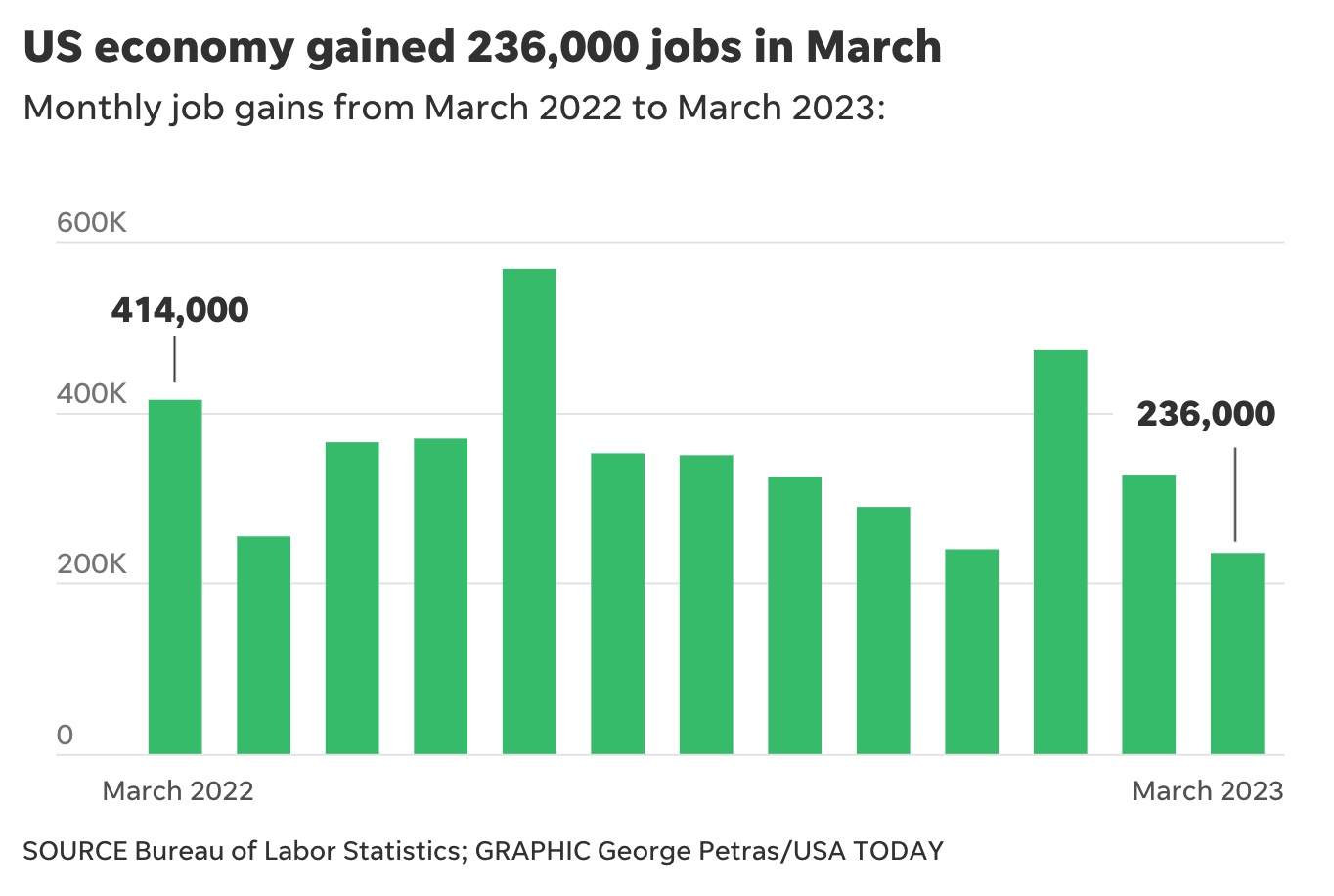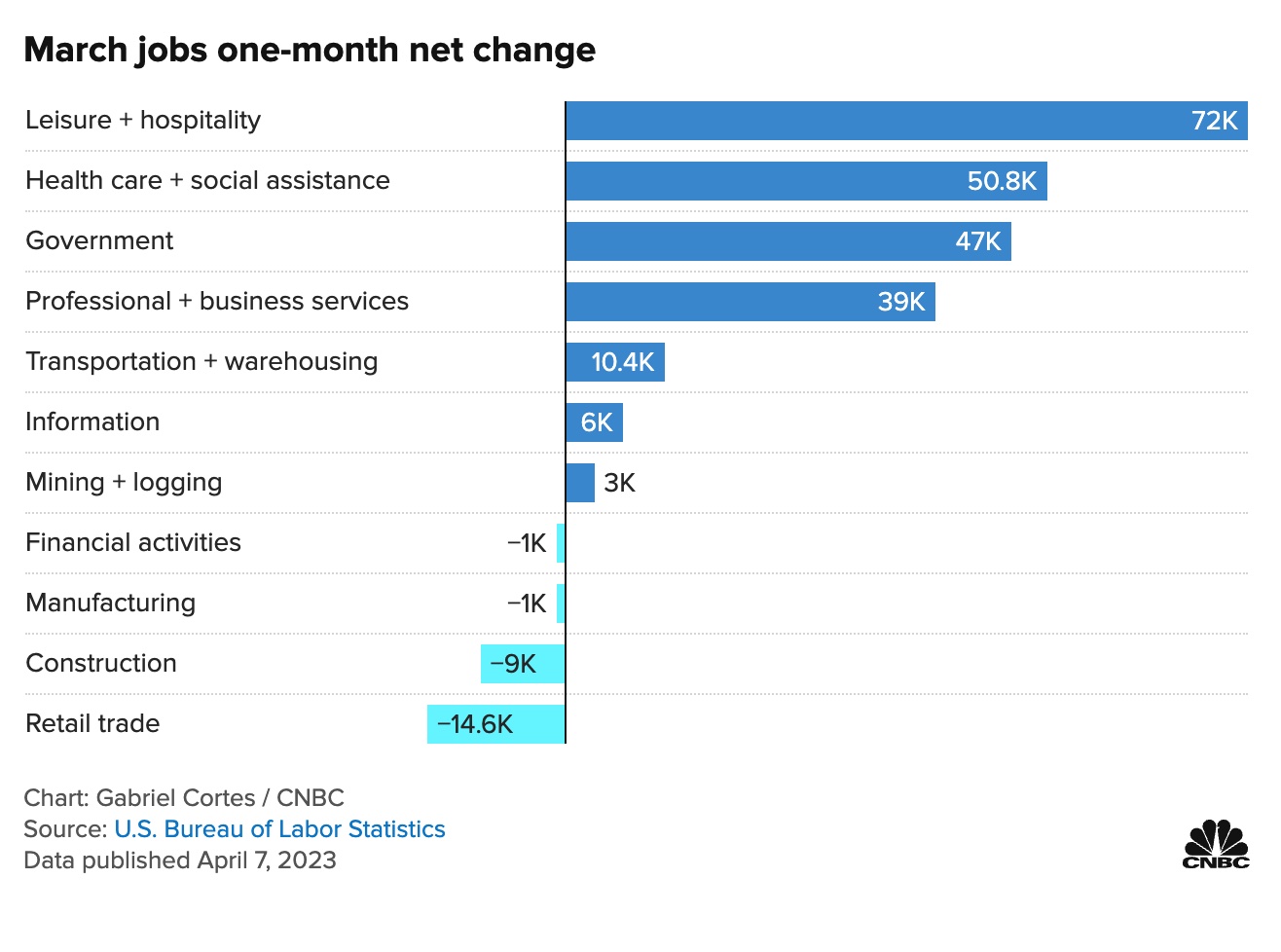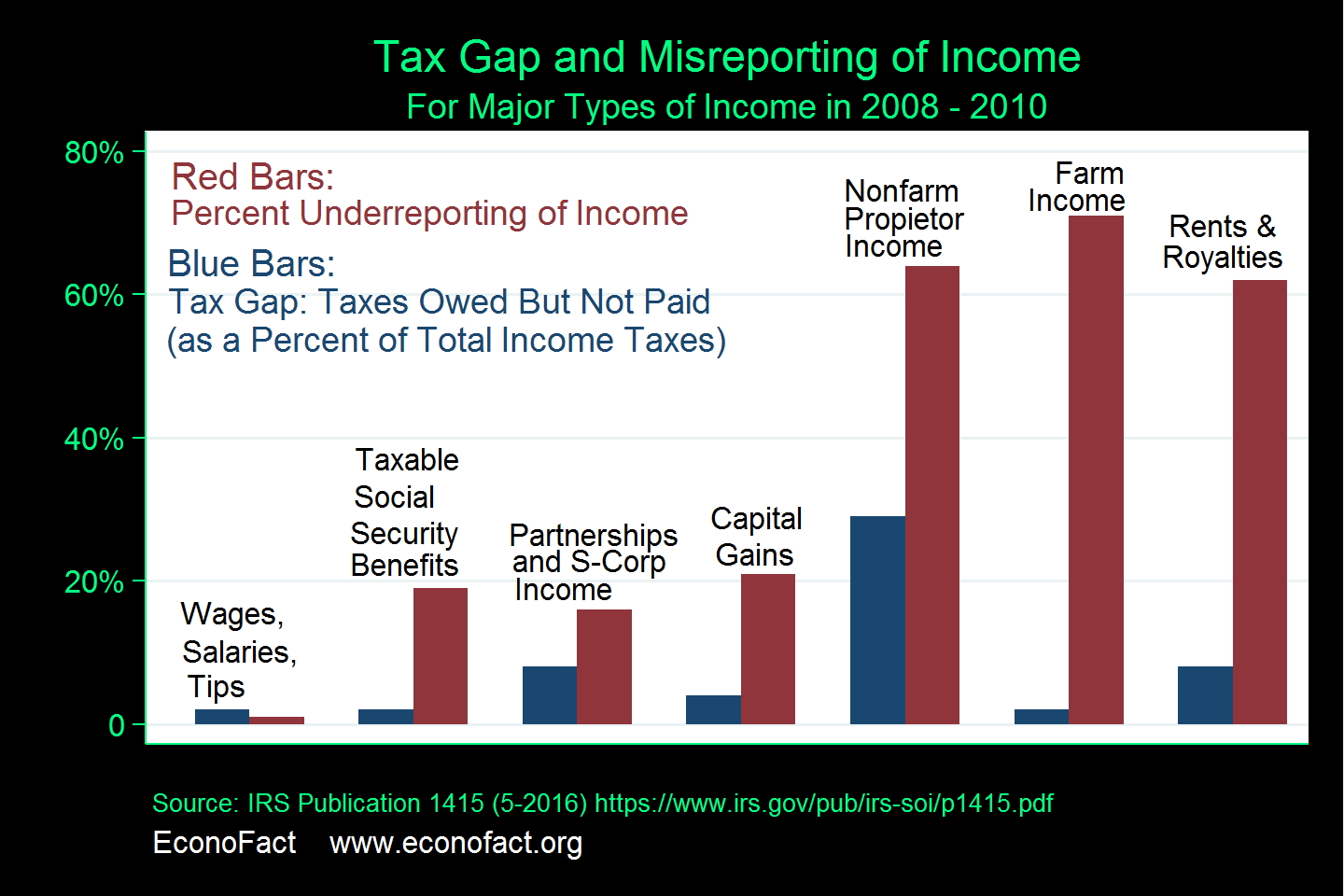U.S. Economy Adds 236,000 Jobs in March; Jobless Rate Edges Down to 3.5%

Labor force participation rate highest since pandemic began

|
In Today’s Digital Newspaper |
The Labor Department's jobs report showed a continued slowdown in employment — adding to other signs this week that the economy may be cooling more quickly than believed, potentially risking the hard landing Federal Reserve officials have long tried to avoid. The U.S. economy created 236,00 jobs in March, the least since December of 2020 and in line with expectations. Meanwhile, the jobless rate edged down to 3.5%, below market expectations of 3.6%. Average wages in March were 4.2% higher than a year ago, compared to an annual increase of 4.6% in February. Though the stock market is closed for Good Friday, futures rose following the report. Treasury yields also moved higher. CME Fed funds futures swing toward 25-basis-point increase at the May 2-3 Fed meeting conclusion in the wake of the jobs update, with over 70% probabilities for that to happen against under 30% for no change. Ahead of the report, odds were relatively close between the two possibilities. More in Markets section.
The IRS has released its strategic operating plan for spending $80 billion in extra funding over the next decade, and reiterated that audit rates would not increase for small businesses and households making less than $400,000. Details in Policy section.
Russia has finally acknowledged that the West is not directly sanctioning Russian exports of grain and fertilizer, but Foreign Minister Sergei Lavrov said the actions to deny access to the SWIFT payment system and for insurance are affecting the shipments. More in Russia/Ukraine section.
Republicans are going to hold a new farm bill confab at Iowa State Univ. on April 12. Details in Policy section.
Bayer’s next chief executive has said he will consider all options to address the “unique challenges” of the pharma and chemicals conglomerate and that the break-up investors are pushing for is not a foregone conclusion. More below via the Financial Times.
The U.K. keeps pushing for a trade agreement with the U.S. and will attempt to convince President Biden when he visits Ireland April 11.
Do not expect quick action on this: The U.S. and five other countries filed notice with the WTO on excess domestic wheat and rice supports by India. Although India had agreed to limit its market price supports to 10% of the value of the crops, the subsidies were 81% for wheat and 94% for rice in 2020/21. More in Trade Policy section.
World food prices fell for a 12th straight month according to U.N./FAO data. More in Food section.
President Biden as widely expected vetoed the congressional effort to halt the WOTUS rule. More in Policy section.
Supreme Court Justice Clarence Thomas accepted luxury trips from a billionaire GOP donor for more than 20 years without disclosing them, a new report revealed. Democratic lawmakers are calling for an investigation. At least two Democratic representatives have called for Thomas to be impeached or resign. More below.
|
MARKET FOCUS |
U.S. equity, financial and commodity markets are closed today but will reopen Monday, April 10. U.S. gov’t offices, however, will be open, with the Department of Labor to release the March Employment report at 8:30 a.m. ET.
U.S. equities yesterday: All three major indices ended higher Thursday, but the S&P 500 and Nasdaq both registered losses for the week while the Dow eked out a gain. The Dow was up 0.6% for the week while the S&P 500 was down 0.1% and the Nasdaq fell 1.1%.
On Friday, the Dow was up 2.57 points, 0.01%, at 33,485.29. The Nasdaq gained 91.09 points, 0.76%, at 12,087.96. The S&P 500 rose 14.64 points, 0.36%, at 4,105.02.
Agriculture markets yesterday:
- Corn: May corn futures closed 9 1/4 cents lower at $6.43 1/2, down 17 cents on the week.
- Soy complex: May soybeans fell 18 1/2 cents to $14.92 1/2, ending the session below the 40-day moving average and is down 13 cents on the week. May meal rose $3.70 to $454.30, while May soyoil ended 69 points lower at 54.53 cents.
- Wheat: May SRW wheat fell 6 1/2 cents to $6.75 1/2, near the daily low and for the week falling 16 3/4 cents. May HRW wheat futures rose 3 cents to $8.64 1/2, nearer the session low and for the week dropping 13 1/4 cents. Spring wheat futures fell 1 1/2 cents to $8.72.
- Cotton: May cotton rose 213 points to 83.20 cents, ending the session above the 100-day moving average and is up 42 cents on the week.
- Cattle: Expiring April live cattle futures jumped $2.675 higher to $171.075 at Thursday’s close, while most-active June futures leapt $2.80 to $163.10. The latter represented a weekly gain of 97.5 cents. Nearby April feeder futures soared $2.80 to $200.625, while May feeders rocketed up $3.30 to $205.40, which marked a gain of 15 cents from last Friday’s close.
- Hogs: June lean hog futures fell 20 cents to $88.175 after hitting a contract low in early trading. For the week, June hogs lost $3.45.
Market quotes of note:
- “The great labor market machine is finally slowing down some, but it’s still got a lot of strength left,” said Robert Frick, corporate economist at Navy Federal Credit Union.
- "It's uncomfortable when we see the labor market weaken, but given how vexing inflation has been over the last two years, some softening of the labor market is necessary," said Sarah House, senior economist at Wells Fargo.
- Today’s Employment report: “Everything is moving in the right direction,” said Julia Pollak, chief economist for ZipRecruiter. “I have never seen a report align with expectations as much as today’s over the last two years.”
- Bullard plays down credit crunch, says Fed must fight inflation. Federal Reserve Bank of St. Louis President James Bullard said steps taken to ease financial strains were working and the central bank should keep raising interest rates to fight high inflation. “Financial stress seems to be abated, at least for now,” Bullard told reporters Thursday after speaking at an event in Little Rock, Arkansas. “And so it’s a good moment to continue to fight inflation and try to get on that disinflationary path.” He added: “I do think we should continue to pursue our interest rate path and make sure that we get the disinflation to occur in 2023 and 2024 so that we put the inflation problem behind us while the labor market is still strong.”
- "More likely than not, a recession is underway now," Comerica Bank chief economist Bill Adams said in a morning note, noting the updated Labor Department data means the uptick in continued jobless claims over the last six months is about as large as increases in recessions dating back to the 1970s.
- FAO food price report today: “While prices dropped at the global level, they are still very high and continue to increase in domestic markets, posing additional challenges to food security. This is particularly so in net food importing developing countries, with the situation aggravated by the depreciation of their currencies against the USA dollar or the Euro and mounting debt burden,” said FAO Chief Economist Máximo Torero.
Total U.S. employment increased by 236,000 in March — the least since December of 2020 but in line with economist expectations and marking the lowest monthly gain since April 2021, according to data released Friday by the Labor Department. Despite growing reports of corporate layoffs hitting the nation's largest employers, the unemployment rate ticked down to 3.5% after it unexpectedly rose to 3.6% in February from a 54-year low of 3.4% in January, and below market expectations of 3.6%. Strong hiring gains in January and February were revised down by a combined 17,000 jobs.
Details: Employment continued to trend up in leisure and hospitality (72K), namely food services and drinking places; government (47K); professional and business services (39K); and health care (34K). Meanwhile, employment edged higher in transportation and warehousing (10K) but fell in retail trade (-15K), namely building material and garden equipment and supplies dealers. Employment showed little change in mining, quarrying, and oil and gas extraction; construction; manufacturing; wholesale trade; information; financial activities; and other services.


Average hourly earnings for all employees on U.S. private nonfarm payrolls rose by 9 cents, or 0.3%, to $33.18 in March 2023, after increasing by 0.2% in the prior month, matching market estimates. Average hourly earnings of private-sector production and nonsupervisory employees rose by 9 cents, or 0.3%, to $28.50. Over the past 12 months, average hourly earnings have increased by 4.2% in March, the least since June 2021, easing from a 4.6% rise in February and slightly below market forecasts of 4.3%.
Labor force participation rate: In an encouraging sign that could ease wage growth and inflation, the share of adults working or looking for a job edged up to 62.6%. That’s the highest since the pandemic started in early 2020 but still leaves it well below the pre-Covid level of 63.4%. A larger labor supply helps ease worker shortages and puts downward pressure on pay as employers don't need to compete as intensely for job candidates.
A Bayer breakup? Bill Anderson joined Bayer’s board this month and will formally become CEO in June. He replaces Werner Baumann who is resigning a year early following pressure from disgruntled investors. The incoming chief executive of Bayer said all options are on the table when it comes to complaints about the 2016 purchase of Monsanto and proposals to separate the company’s agricultural and pharmaceutical divisions. With its share price down 37% over the past five years, ongoing Monsanto litigation and patent protection on some of its best-selling drugs about to expire, “Bayer has unique challenges,” said Anderson. Link/paywall to more via the Financial Times.
April 18 is Tax Day, the deadline for most Americans to submit their income tax returns to the federal government. About one out of every six dollars owed in federal taxes is not paid (see chart). Consequently, annual unpaid taxes are plausibly about three-quarters the size of the entire annual federal budget deficit.

Market perspectives:
• Outside markets: The U.S. dollar index was only trading in electronic activity and was firmer. The bond market will trade abbreviated hours today, closing at noon CT, with the 10-year note yield at 3.37% ahead of U.S. action. Crude oil was under pressure in electronic trade and markets will be closed today. U.S. crude was around $80.46 per barrel and Brent around $85 per barrel.
• NWS weather outlook: Heavy rain with the potential for scattered flash flooding over the Lower Mississippi Valley and Southeast this weekend... ...Unsettled weather forecast throughout much of the Pacific Northwest...

|
RUSSIA/UKRAINE |
— Secret documents detailing American and NATO plans for building up the Ukrainian military have appeared on Twitter and Telegram. Link for details. Some of the documents may have been doctored. Analysts suspect the leak is part of a Russian disinformation campaign. The Pentagon has launched an investigation.
— Russia acknowledged the West is not directly sanctioning Russian exports of grain and fertilizer, but Foreign Minister Sergei Lavrov said the actions to deny access to the SWIFT payment system and for insurance are affecting such shipments. Speaking at a news conference after meeting with Turkish Foreign Minister Mevlut Cavusoglu, Lavrov said that Russia may have to work outside the Black Sea Grain Initiative if Western countries maintain “obstacles” and that Russia will have to think carefully if the restrictions are not eased.
Lavrov chided European countries complaining about an influx of Ukrainian grain, saying if they have surpluses, those should be moved to poorer countries. Cavusoglu said Turkey would continue its efforts to try and bring the conflict to a close, but expressed concern tensions could escalate in the spring.
— Ukraine could export 15.6 million tonnes of grain in April-June which would put total grain shipments at 52.8 million tonnes for 2022-23, according to a Ukrainian official quoted by the AgroPortal agency. Taras Vysotskiy, first deputy farm minister, said the April-June exports could include 10 million tonnes via the Black Sea grain deal and another 5.6 million via other routes. Ukraine exports have already hit 37.2 million tonnes so far in the 2022-23 year, including 20.6 million tonnes via the Black Sea grain deal.
— Russia will not cancel its export tariffs in place on sunflowerseed that currently total 50% with a minimum amount of $320 per tonne, the Interfax news agency reported, citing Oksana Lut, deputy agriculture minister. She said Russia harvested 29 million tonnes of oilseeds in 2022 with crushing capacity of around 26 million to 28 million tonnes, with plans to add another 3 million tonnes of capacity over the next year.
— Microsoft Corp. agreed to pay more than $3 million in fines for allegedly violating U.S. sanctions on Russia and other countries after its software and services ended up in the hands of blacklisted companies and persons in the Crimea region of Ukraine. The majority of the apparent violations involved blacklisted Russian entities in Crimea, but others were tied to blacklisted entities in Cuba, Iran and Syria, authorities said. In total, Microsoft sold more than $12 million in products and services to blacklisted parties.
— S&P Global Ratings lowered Ukraine’s sovereign credit rating to ‘CCC’ from ‘CCC+’ and changed its outlook to 'negative' from 'stable'. The rating action follows Ukraine's official announcement that it will restructure its foreign currency external debt to restore public debt sustainability by midyear 2024, as part of the recently agreed, four-year, $15.6 billion Extended Fund Facility arrangement with the IMF. The country is suffering from significant macroeconomic and fiscal pressures triggered by the ongoing war with Russia.
Moody's credit rating for Ukraine was last set at Ca with stable outlook.
Fitch's credit rating for Ukraine was last reported at CC with n/a outlook.
Background. In general, a credit rating is used by sovereign wealth funds, pension funds and other investors to gauge the credit worthiness of Ukraine thus having a big impact on the country's borrowing costs.
|
POLICY UPDATE |
— Biden vetoes congressional bid to undo WOTUS rule. President Biden on Thursday vetoed an attempt by Congress to undo waterway pollution regulations put forward by his administration — marking the second veto of his presidency and effectively killing the attempt to nullify the Waters of the U.S. (WOTUS) rule. In a statement on the veto, Biden said that the water regulation “provides clear rules of the road that will help advance infrastructure projects, economic investments, and agricultural activities — all while protecting water quality and public health.”
Next steps: The White House had previously announced that Biden would veto the congressional measure, which is unlikely to be able to get the two-thirds majority needed to override the veto. A spokesman from House Majority Leader Steve Scalise (R-La.) said the chamber will hold a vote to override the president’s veto when Congress comes back from recess, but didn’t offer timing for it. Meanwhile, the Supreme Court by July will issue a ruling on WOTUS, which could affect the rule that went into effect March 20 except for two states — Idaho and Texas.
— New farm bill discussion slated for April 12 at Iowa State Univ. Iowa GOP Sens. Joni Ernst and Chuck Grassley will host Senate Ag Committee Ranking Member John Boozman (R-Ark.), Iowa Secretary of Ag Mike Naig, and Iowa State University President Wendy Wintersteen next Wednesday morning, April 12, at the Iowa State University Research Park.
— IRS details priorities to spend $80 billion in long-awaited plan. The IRS on Thursday released its long-awaited strategic operating plan (link) for how it intends to spend its nearly $80 billion in multiyear funds, with new Commissioner Danny Werfel strengthening the agency’s vow to not increase audit rates for households making under $400,000.
IRS plans to bring on about 10,000 new employees in the current fiscal year, most of whom will focus on taxpayer services. In fiscal year 2024, the agency will double that to nearly 20,000 hires, with $1.4 billion and the plurality of new staff going toward enforcement.
The agency has signed two contracts to assist with recruiting and background investigations, while the Office of Personnel Management has provided expedited hiring authority for up to 10,000 Taxpayer Service and Enforcement positions annually through 2027.
Bottom line: IRS plans to spend about $47 billion on tax enforcement efforts, $7.5 billion on taxpayer services, $12 billion technology improvements, $4 billion on energy security and $8 billion on hiring and retention.
|
CHINA UPDATE |
— Xi Jinping: ‘Wishful thinking’ to expect Beijing to compromise on Taiwan. The Chinese leader made his first public comment since Taiwanese President Tsai Ing-wen’s meeting with House Speaker Kevin McCarthy (R-Calif.). Xi made the remarks to European Commission President Ursula von der Leyen during a meeting in Beijing on Thursday, when he also stressed that China was a good partner for Europe in handling global challenges. “[The] Taiwan issue is the core of China’s core interests. The Chinese government and Chinese people will never agree to anyone making a fuss about the one China issue,” Xi said, according to a foreign ministry statement. “Anyone who expects China to compromise on the Taiwan issue is [engaging in] wishful thinking and will only shoot himself in the foot.”
— China imposed sanctions on figures associated with the recent visit of Tsai Ing-wen, Taiwan’s president, to the United States. The Ronald Reagan library — where Tsai met House Speaker Kevin McCarthy (R-Calif.) on Wednesday — was among the American organizations and officials targeted. Hsiao Bi-khim, Taiwan’s de facto ambassador to America, was also hit with sanctions; along with her family, she was banned from entering China, Hong Kong and Macau.
— China publishes its year-over-year inflation rate for March on April 10. Economists forecast it will rise back to about 2%, from the previous month’s low 1%.
|
TRADE POLICY |
— U.K. wants to revised U.S. trade talks when Biden visits Ireland. The U.K. is seeking to restart talks with the U.S. for a trade deal, hoping to overcome President Joe Biden’s reluctance over agreements that some say are unpopular with key American voters. British officials are expected to privately lobby their American counterparts to reopen dialogue when Biden visits Northern Ireland on April 11, according to reports. Business and Trade Secretary Kemi Badenoch has been leading U.K. efforts to get what the government hopes will be a trade deal in “all but name.”
— U.S., five other countries notify WTO on excess domestic wheat and rice supports by India. The U.S., Australia, Canada, Paraguay, Thailand and Ukraine have filed a counter notice at the WTO which contends India is paying subsidies to its wheat and rice producers at levels above its commitments.
Details:
- The countries said that India’s 2020-21 market price support (MPS) for rice were 93.9% of the value of production and MPS for wheat at 81.3%. For marketing years 2014-15 MPS for rice as a percentage of the value of production ranged from 78.6% to 93.9%, while that for wheat ranged from 70.8% to 81.3%.
- Under India’s WTO commitments, they can provide trade distorting support like MSPs equivalent to 10% of the total value of crop production. For the 2020-21 marketing year, India reported MPS for rice amounted to 15.16% of the value of production, but the notification pegged the amount at a much higher 93.9%.
- The countries maintained that from 2014-15 through 2020-21, India’s MPS as a percent of the total value of rice production rose steadily with each successive marketing year.
- For wheat, the countries said the MPS stood at 81.3% as a percent of total value of India wheat production, with a range of 65% to 81.3% for the 2014/15 through 2020/21 period.
In 2020, India’s ag exports were worth $39 billion, said the WTO counter-notification (link). “India’s agricultural export growth of 65 percent from 2010-2020 has been supported by India’s rice exports, which increased by 244 percent over the same period, accounting for 24 percent of all Indian agricultural exports,” said the document. It said input subsidies and market support prices were the primary forms of assistance to farmers. “This support appears to have contributed to expanding production and government stocks, coinciding with increased exports.”
Exporter nations said at a WTO committee meeting on March 27 that India was dodging their questions about food grain subsidies.
“This is a far cry from the level playing field our farmers were promised and deserve,” said Sen. John Boozman (R-Ark.) from the No. 1 rice state. “This is further evidence that we need to pursue a formal complaint against India’s blatant violations with the WTO.”
Perspective: If you think this issue has been going on for years, you are correct. U.S. rice and wheat producers have long complained about India’s subsidies and said the data filed by the countries continues to confirm their concerns. The U.S. submitted the first WTO counter-notification on agriculture in 2018 to dispute India’s report on rice and wheat subsidy outlays. And as we all know, any dispute settlement case at the WTO takes years to unfold.
|
ENERGY & CLIMATE CHANGE |
— Elon Musk says converting the world to entirely clean energy will require $10 trillion of investment, but continuing to rely on fossil fuels would cost about $4 trillion more. Tesla Inc.’s white paper fleshes out the vision Musk outlined during last month’s investor day. Link to details via Bloomberg.
Meanwhile, Tesla cut prices on its electric vehicles in the U.S. for the fifth time this year. The company is probably responding to a change in America’s tax-credit system: later this month subsidies on certain EVs will be cut or eliminated. It is also trying to boost demand.
— Walmart plans to add thousands of EV charging stations by 2030, joining a broader push to make it easier for U.S. motorists to pivot away from cars powered by fossil fuels.
— EPA to transfer CBI data to Argonne National Laboratory and DOE for lifecycle analysis under the GREET model. The EPA Office of Transportation and Air Quality (OTAQ) announced it will release information that may have previously been considered confidential business information (CBI) to the Argonne National Laboratory (ANL) and Department of Energy (DOE) under a contract for them to perform lifecycle analysis modeling with the Greenhouse gases, Regulated Emissions, and Energy use in Technologies (GREET) Model.
Background. EPA collects the information from those submitting petitions to the agency for pathways for fuels under the Renewable Fuel Standard (RFS). Some of that data is claimed to be CBI such as agricultural practices, crop yields, nutrient inputs, expected biofuel facility operational data, and detailed descriptions of the processes to be used, with a Federal Register notice (link) indicating that “some of this information may be entitled to confidential treatment.” The GREET model is favored by the U.S. biofuel industry in determining lifecycle analysis as it is updated on a regular basis with new data such as the information that will be transferred to ANL/DOE by EPA under this notice.
Information transfer will take place starting April 17 and the ANL and DOE are to return the information to EPA once the work is completed.
— South Korea will provide $5.3 billion of financial support for local battery makers that are seeking to build plants in North America, a response to Biden’s climate bill that encourages EV production in the U.S. and the sourcing of EV supply chain components outside of China.
— A new battery technology is now moving into production; boosts maximum vehicle ranges by 20%. Silicon Valley-based Sila Inc. says it has finalized a mass manufacturing process for the first silicon-based anodes, which it’s calling “Titan Silicon.” Sila says its anodes will immediately boost maximum vehicle ranges by 20%, and already has its first customer: Mercedes will use Titan Silicon anodes in its long-range EQG SUV, the electric version of the automaker’s boxy G-Wagon, starting in early 2025. Sila Chief Executive Officer Gene Berdichevsky says the company will be able to make enough material for up to 200,000 electric vehicles a year by 2026, and enough for a million vehicles a year by 2028.
— Ram unveiled its new electric pickup, the 1500 REV, at the New York Auto Show this week. The pickup, which is expected to go on sale late next year, features not only a 350-mile range option, but also a second, longer-range option that aims to reach 500 miles.

|
LIVESTOCK, FOOD & BEVERAGE INDUSTRY |
— World food prices fall for 12th consecutive month. The FAO Food Price Index dropped to 126.9 points in March 2023, hitting the lowest level since July 2021, and down 20.5% from the record hit in March 2022.
The cost of cereals declined 5.6%, with international prices falling 7.1% for wheat, amid ample global supplies and strong competition among exporters. The decline in wheat prices was credited to increased Australian production, improved European Union wheat ratings, “high supplies” from Russia and ongoing exports from Ukraine, the FAO said.
Prices for vegetable oils went down 3% as lower soybean, rapeseed and sunflower oil quotations more than offsetting higher world palm oil prices; and cost of dairy edged 0.8% lower, driven by cheese and milk powders, while butter prices increased. The vegoil index decline came as there are “ample world supplies and subdued global import demand.”
Prices rose for meat (0.8%), amid rising internal prices in the U.S., where cattle supply is expected to be lower in the months ahead.
Prices also went up for sugar (1.5%), with the index hitting its highest level since October 2016 amid concerns over lower global availabilities in the 2022/23 season, following declining production prospects in India, Thailand, and China.
— Agrifood employment: About 1.23 billion people, or 15% of the world’s population, are employed in the global agrifood system, and nearly two-thirds of them are in Asia, according to the first systematic global estimate. Link for details.
|
OTHER ITEMS OF NOTE |
— A ProPublica report (link) reveals Supreme Court Justice Clarence Thomas has been accepting trips from real estate magnate and Republican megadonor Harlan Crow without disclosing them as required, including the use of Crow’s private jet and regular stays at his private resort for more than 20 years. The Senate Judiciary Committee said it “will act” on the allegations, with committee chairman Dick Durbin (D-Ill.) adding the report “is a call to action.”
Some of those luxury vacations included…
- Nine days on a megayacht in Indonesia, a trip that would have cost Thomas and his wife $500,000+ had they paid for it themselves, ProPublica wrote.
- Summer stays at Crow’s estate in the Adirondacks, Camp Topridge, where Thomas reportedly came into contact with execs at Verizon and PwC, as well as big GOP donors.
— Cotton AWP moves higher a second week. The Adjusted World Price (AWP) for cotton moved up to 69.88 cents per pound, effective today (April 7), up from 67.84 cents per pound and the second weekly rise in a row. Despite the rise, the AWP remained below 70 cents per pound for a fourth straight week.
— White House rolls out its annual post-Easter celebration Monday with flocks of kids and 30,000 eggs on the South Lawn despite suggestions that it opt for potatoes or even rocks amid an avian flu outbreak and soaring prices.
|
KEY LINKS |
WASDE | Crop Production | USDA weekly reports | Crop Progress | Food prices | Farm income | Export Sales weekly | ERP dashboard | California phase-out of gas-powered vehicles | RFS | IRA: Biofuels | IRA: Ag | Student loan forgiveness | Russia/Ukraine war, lessons learned | Russia/Ukraine war timeline | Election predictions: Split-ticket | Congress to-do list | SCOTUS on WOTUS | SCOTUS on Prop 12 | New farm bill primer | China outlook | Omnibus spending package | Gov’t payments to farmers by program | Farmer working capital | USDA ag outlook forum |






